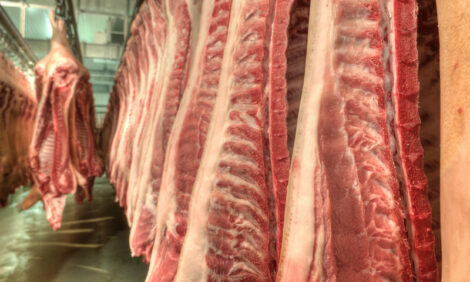



<em>Toxoplasma gondii</em> Infection and Outdoor Swine Production
Production systems that allow animals to have outdoor access could increase the risks of animals to be infected with T. gondii, warns Wayne Du, Pork Quality Assurance Program leader with the Ontario agriculture ministry in Pork News and Views from OMAFRA. This poses a food safety risk as people may get toxoplasmosis by consuming undercooked or raw meat from infected animals.Swine production systems that offer outdoor access to the animals – such as free range, organic and natural pork production – have become increasingly popular worldwide. While these systems offer improved animal welfare they may create new problems for animal health and food safety. For example, studies show that pigs raised from organic and free range production systems are associated with higher risk of Toxoplasma gondii (T. gondii) infection than the animals raised from conventional (indoor) operations.
T. gondii and Toxoplasmosis
T. gondii is a tiny, single-celled (protozoan) parasite that is infectious to most warm-blooded animals, birds and humans. An infection caused by T. gondii is called toxoplasmosis. Cats are the definitive hosts, meaning that the parasite is unable to complete its entire life cycle without cats. Other animals and birds are intermediate hosts, or the carriers, of T. gondii. Newly infected cats, especially kittens, may shed millions of oocysts in their faeces for a period of three to 10 days.
Once in the environment, oocysts start to sporulate (mature) and become infectious to new hosts. Infection occurs when animals ingest either sporulated oocysts in soil, feed, water, cat faeces or any other materials or cysts contained in the tissues of rodents, wildlife or other animals. People may get toxoplasmosis from consumption of undercooked or raw meat from infected animals.
High T. gondii Prevalence Associated with Outdoor Production
* "2.9 per cent of the pigs from 'animal-friendly' systems, and 39 per cent of the farms tested positive for T. gondii" |
The prevalence of T. gondii in Ontario's pig population raised from conventional production system appears very low (1.5 per cent) due to improved housing, management and production practices made in modern pork production. However, studies show that production systems that allow animals to have outdoor access could increase the risks of animals to be infected with T. gondii. One study from Brazil reported that 86.08 per cent of 115 pigs raised from production systems with outdoor access tested T. gondii positive. The author concluded that faecal contamination of the environment by cats or by consumption of infected rodents were probably the most significant source of toxoplasmosis in outdoor-reared pigs.
Results from another study conducted in the Netherlands showed that 2.9 per cent (38 of 1,295) of the pigs from 'animal-friendly' systems, and 39 per cent (13 of the 33) of the farms tested positive for T. gondii. None of the 621 slaughter pigs from the 30 conventional (indoor) farms tested positive.
This clearly demonstrated that animals raised from animal-friendly systems have higher risks to T. gondii infection than those raised from conventional production systems.
On-Farm Control of T. gondii
Rodent control on organic or free-range production systems is especially important because animals from these systems are exposed to higher risk of T. gondii infection than the animals raised from conventional production systems. Also, the traditional control methods such as the use of rodentcides do not fit with the philosophy of organic farming. For effective rodent control, producers need a thorough understanding of the ecology of the rodent species. Based on this ecological understanding, a rodent management strategy can be designed consisting of prevention, monitoring and control.
Below are some good production practices that may help control this parasite.
- Keep cats out of the production system and ensure cat faeces do not contaminate feed and water. If cats are kept on the farm, a stable, mature population might be safe.
- Adopt an integrated rodent control programme to minimise mouse and rat populations.
- Tighten biosecurity programmes to keep wildlife, such as birds, skunks and raccoons from accessing pigs and the production area.
- Never feed edible residual material (ERM) containing meat products. The feeding of this class of ERM to pigs is prohibited in Canada.
February 2011






